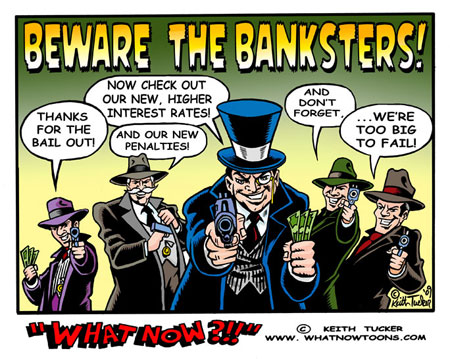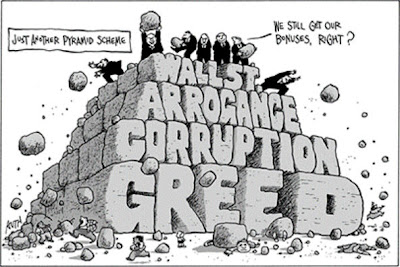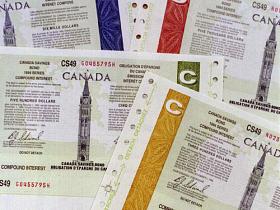War, Debt, Oil and Bonds: 101

There is a lot of chatter about the "sovereign debt crisis" in Europe these days but I wonder if people understand what that really means. The problem is not lack of money, its the Bond Market -- and Canadian Governments, Banks, Trust Funds, Mortgage and Insurance Co.‘s, Mutual Funds etc. all hold international Bonds. In Europe in 2011, 2012, the "sovereign debt issue" is not only the failure of Ireland and Iceland and the potential failure of Greece (and maybe Portugal or Spain or even Italy) to pay the high interest charges on new Bond issues and the consequent reluctance of buyers to risk buying the Bonds. There are also the very large potential losses that many Banks and Pension Funds may suffer owing to the possible loss in value of previous Bond purchases if they are never redeemed or rolled over. i.e. default. Hence the "bail outs" to the financial institutions to keep them solvent and avoid a domino effect if the first major bank fails. Even these "bail outs" rely on Bond stability. Hence the reluctance of the German Banks and the European Central Bank to continue dumping money down an apparently bottomless hole if the Bond crisis is not resolved through austerity measures. But cuts in social measures increase the difficulty of collecting revenues to pay the interest costs that are the first charge on payment of debts. Hence the alternative pressure on the holding Banks to "take a haircut" of 50% on the value of outstanding Bonds. This is compounded by the super powers frantic scramble for un-aligned and diminishing energy resources. This is particularly relevant for the United States which relies on oil being traded in dollars to sustain its own money stability. It has and will deliberately destroy any Nation that trades oil in a free Bourse. (Iraq and Libya done and Iran and Venezuela to come). Those “petro-dollars” enable the United States to sell its Bonds worldwide in exchange for dollars to fund its war machine and Trade Deficit. A matter of economic survival for the United States and a delicate balancing act for everybody with or without oil reserves! This may help to evaluate the half-baked corporate news. The History of the Bond Market 1. A Bond is something that the vendor, be it government or corporation, sells to a Financial Institution for cash. 2. Governments sell Bonds/Treasuries/Equities in order to cover the annual difference between tax revenues and expenditures. 3. If Bonds are not redeemed when due they accumulate and create the National Debt almost in perpetuity. 4. Massive expenditures, as in times of war, entail large issues of Bonds and increases in the National Debt. 5. Excessive Annual Deficits may make Bond Auctions more difficult leading to demands for higher interest rates. If this situation becomes chronic leading to buyer reluctance to buy Bonds at less than excessive interest rates we get what is called a "sovereign debt crisis". Bonds can be traded and discounted in a Bond Market Bonds came into existence when traders needed to raise cash for a venture and would offer a 'bond', guaranteeing repayment plus interest. (This is similar to a 'Note' or mortgage, equivalent to cash, issued by a lender in exchange for collateral or acknowledgement of a debt. The difference being in who initiates the transaction.) Bonds became significant in the 1300's and 1400's CE when the warring City States in Italy became so indebted that they had to forcibly issue Bonds to their citizens in order to raise cash to pay for the mercenaries that were fighting on their behalf. It can truly be said that wars created the Bond Market and modern war is only possible if funded by Bonds. Some families such as the Lombards and Medicis became fabulously wealthy through the interest accruing from bonds sold by national states. They often funded both sides of the conflict. Example of Bond Trading: the British Government sold Bonds (Consuls) for 20 years to pay for the Napoleonic war with France. This established the Rothschild Bank. The Rothschild name became feared and hated leading to a general resurgence of anti-Semitism and the stereotype of the avaricious moneylender. By the mid 1800's the Rothschilds were what we would now call fund managers. Example: The American Civil War may be said to have been lost financially by the South when they bet wrongly on the value of Confederacy Bonds. Confederacy Bonds, which the Rothschilds would not buy, had to be backed by cotton. The South decided to reduce the supply of cotton in order to increase the value of their Bonds and went so far as to embargo the sale of cotton to England because England was nominally supporting the Union (North). The British cotton industry collapsed. Confederacy Bonds peaked. But Union forces fought their way down the Mississippi until they captured New Orleans and cut off the export of cotton. Confederacy Bonds lost value; no more could be sold; and the South was reduced to printing Confederate notes or "Greybacks" but inflation exploded and the currency became worthless. The world Bond Market is currently valued in the order of $85trillion and is larger than the value of all the world stock markets combined. One Bond Fund in London U.K. holds $700billion in Bonds on behalf of clients. Sovereign Bonds control government and private pensions. This is why stability and confidence in the Bond market is important for everyone. Bonds are rated by Rating Agencies such as Moodies and Standard & Poors. These Agencies hold enormous power based on their ability to raise or lower confidence in a Bond by minute changes of classification e.g. from AA+ all the way down to Junk Bonds and Inflation Inflation is the opposite of stability Inflation is anathema to the Bond Market which is why Bond Traders and Governments need it to be controlled and minimised. Bond interest is always payable on the face value of the Bond not the depreciated value. Example. Suppose a Bond is issued for $100 at 5% and its value on the Bond Market decreases to $50. The 5% on $100 will pay $5 which is 10% of the $50 value. If the Bond value dropped to $10 the payback would be 50% p.a. If inflation rises the government may increase interest rates in order to curb that rise. New Bond issues will incur higher rates of interest in order to attract investors. Existing Bond prices will fall. Bond trading is a high risk environment where large volume trades at minute fractions of a per cent in depreciated or appreciated value with the corresponding variations in interest rates can represent large losses or gains. Example: Argentina 1989. The government had to cope with internal wars between Generals and the Falklands War with Britain. In February inflation was running at 10% per month. The Banks were ordered closed. But the Austral (Argentine money unit) value still dropped by 140%. The World Bank froze any lending. The government tried to finance its operations by selling Bonds to the public but no-one was buying on account of inflation. Bond prices collapsed. Money denominations reached into the 1,000's. On April 28th the government ran out of money with no paper to print notes and the printers on strike. By June inflation was 100% per month. This was similar to post WW 1 Germany except that rioting and looting also were rampant. Fixed income earners and pensioners were the worst hit. 70% of the population was being fed in soup kitchens. Final recovery took years and was only due to growth in the number of Bond holders. The Eurozone represents an interesting conundrum for which the only way out as I see it is controlled inflation in the infected country in which everyone loses a bit but no one entity has to go belly up. I understand this is what Iceland did. They are now recovering nicely.


The Rothschild (German Jewish) banking dynasty became fabulously wealthy when Nathan Rothschild was commissioned by the British government to acquire gold and silver to be used to pay Wellington's troops. When the war was suddenly over at the Battle of Waterloo he used his 48 hour news advantage to spread the rumour that all was not well. This created panic selling of vast numbers of Consuls which he bought at a discount and later sold for profit calculated to be £600million in today's money values.![]()

Comments
There are 0 comments on this post

















